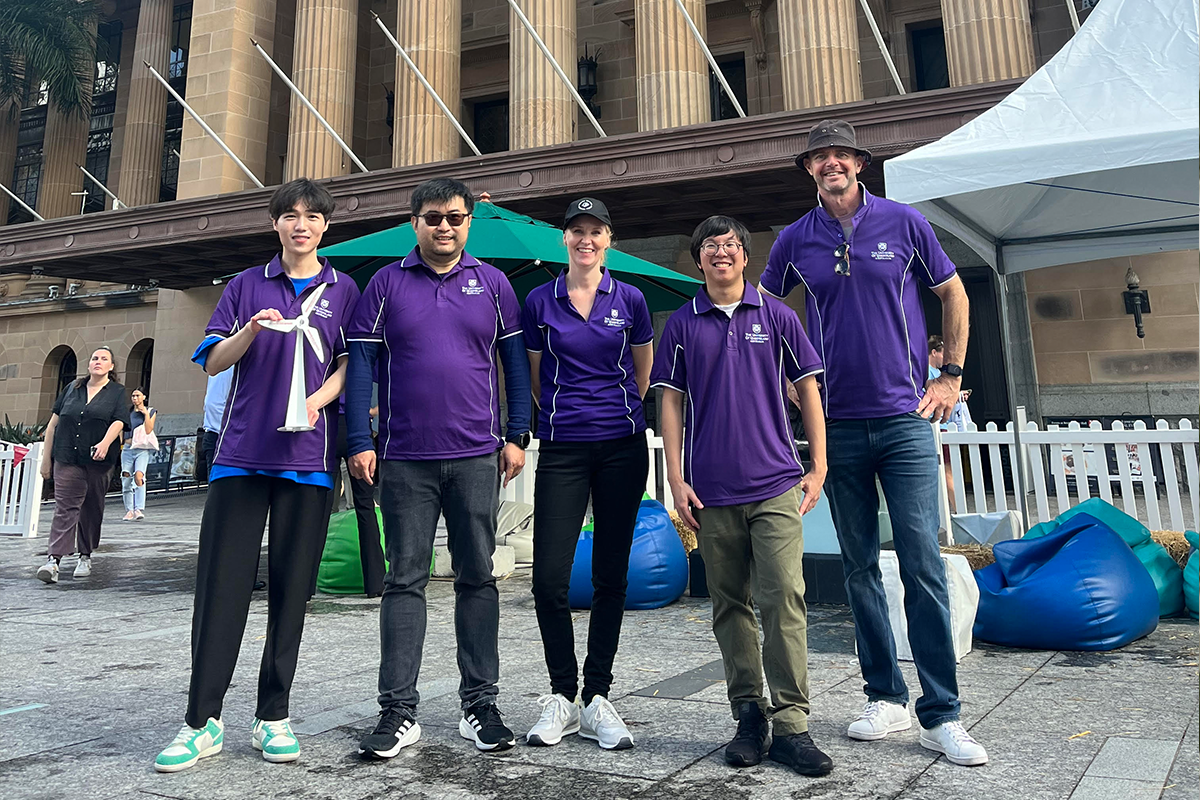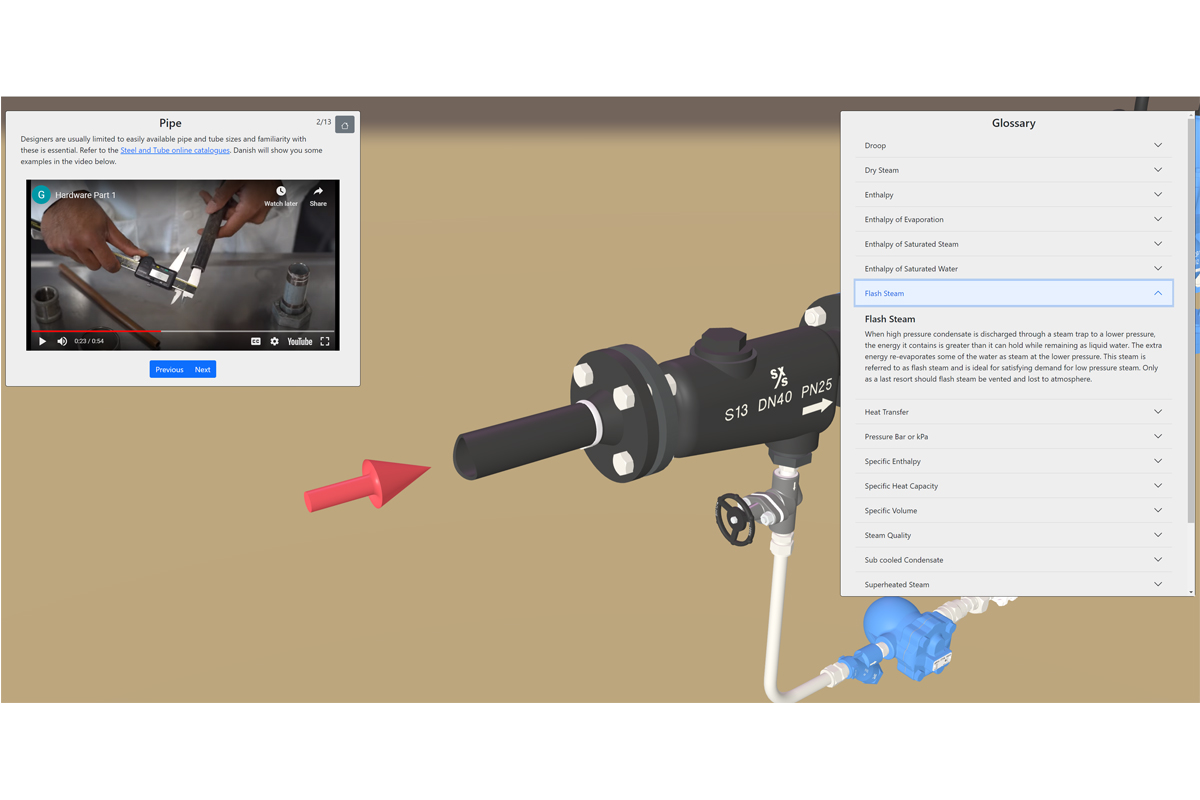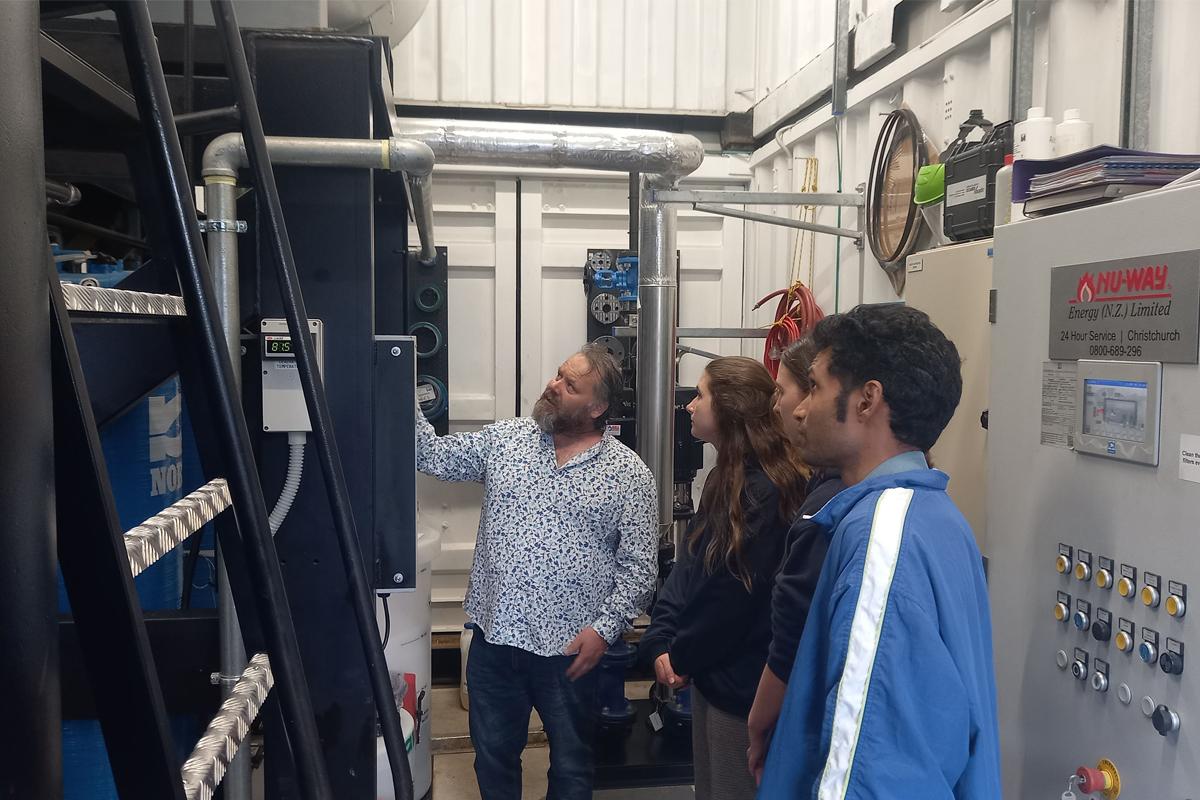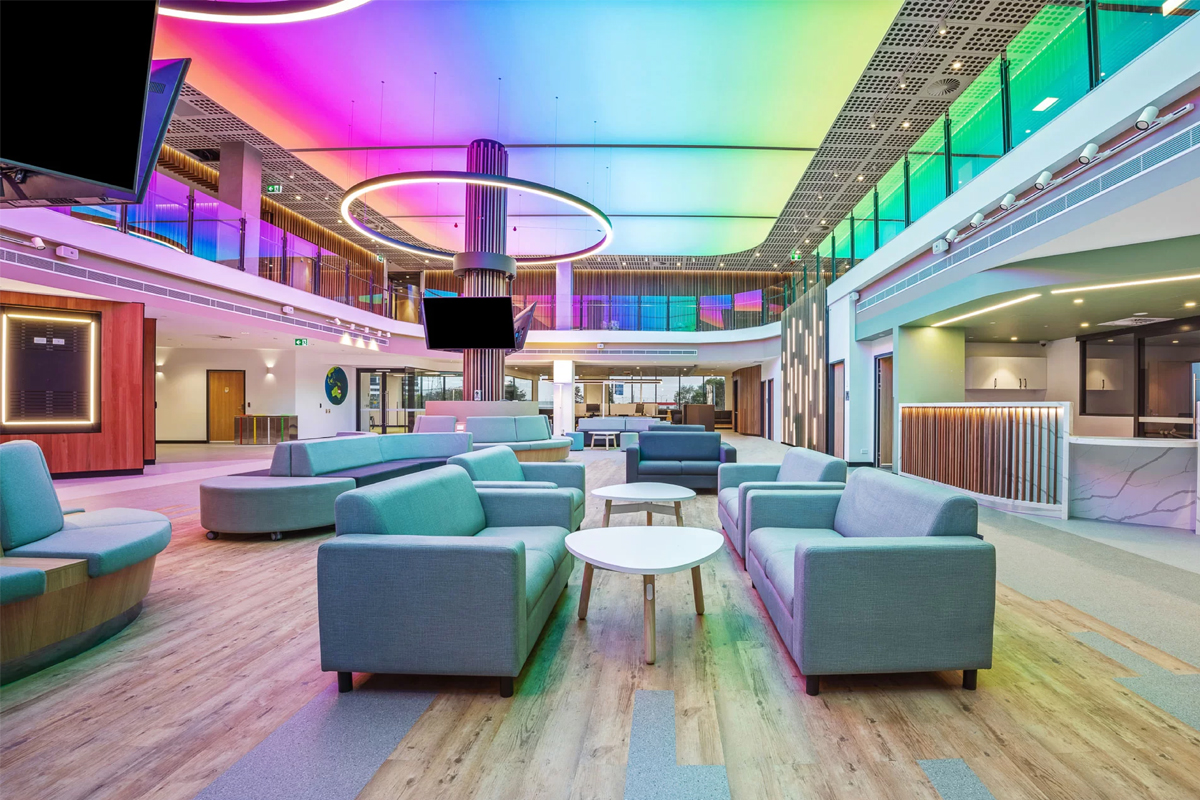Next Generation Learning & Skills category
The SHED is a dedicated space to connect with the community and promote and practice sustainability at QUT and beyond. For practicality, the SHED needed to be able to function as both an active and a passive space, be transportable and be designed for deconstruction. We wanted the SHED to be more than just a space for sustainability; we wanted the project to foster collaboration across university organisational areas and provide students with real world opportunities to engage with Indigenous Australians, clients, the architect, and the builder to create a living design that could be showcased on campus, whilst also providing students with real world professional work experience. We wanted the project to embody the goals of QUT’s Education for Sustainability project (to embed sustainability into all undergraduate courses by 2026), and goals across numerous themes in the Sustainability Action Plan, whilst also considering the principles of QUT’s Campus to Country Positioning Strategy, which outlines the importance of connecting to Country and overlays the Estate Master Plan and the priorities of QUT’s Connections Strategy (2023-2027). The SHED is a small but mighty project embodying QUT values, priorities, and goals whilst also connecting student aspirations to real world opportunities.
A collaboration between Facilities Management, the Faculty of Engineering and the Faculty of Creative Industries, Education and Social Justice (CIESJ) saw the project embedded into three QUT undergraduate units. In the introductory unit UXB100 Design Thinking for the Built Environment (Faculty of Engineering, School of Architecture and the Built Environment), students were asked to prepare a brief that could actualise the project with a budget of $75,000. This student-led brief was then embedded into two units: DAB101 Architectural Design 1: Explorations (Faculty of Engineering, School of Architecture and the Built Environment) and DYB301 Impact Lab 4: Purpose (Faculty of Creative Industries, Education and Social Justice, School of Design), as a practical, sustainable design project.
Students were required to meet with the client (QUT Sustainability Manager), the Project Manager (QUT Capital Works), Principal Planning and Design Consultant (QUT Estate Planning), QUT’s Elder in Residence and Traditional Owner, and the Deputy Vice-Chancellor (Indigenous Australians) to receive input into brief development and design requirements and guidance on applying QUT’s Campus to Country Positioning Strategy principles. The designs were completed and presented to QUT Facilities Management. Facilities Management went on to select one student design from each unit DAB101 and DYB301 to be developed further and employed two students to work collaboratively with the QUT Sustainability Manager, the QUT capital works team, the architect (Eco Effective Solutions) and the builder (PODcon) to bring their design ideas together and create the final design for the Facilities Management team. The Facilities Management team engaged PODcon to build the design, which was delivered to the Gardens Point campus in early August 2023.
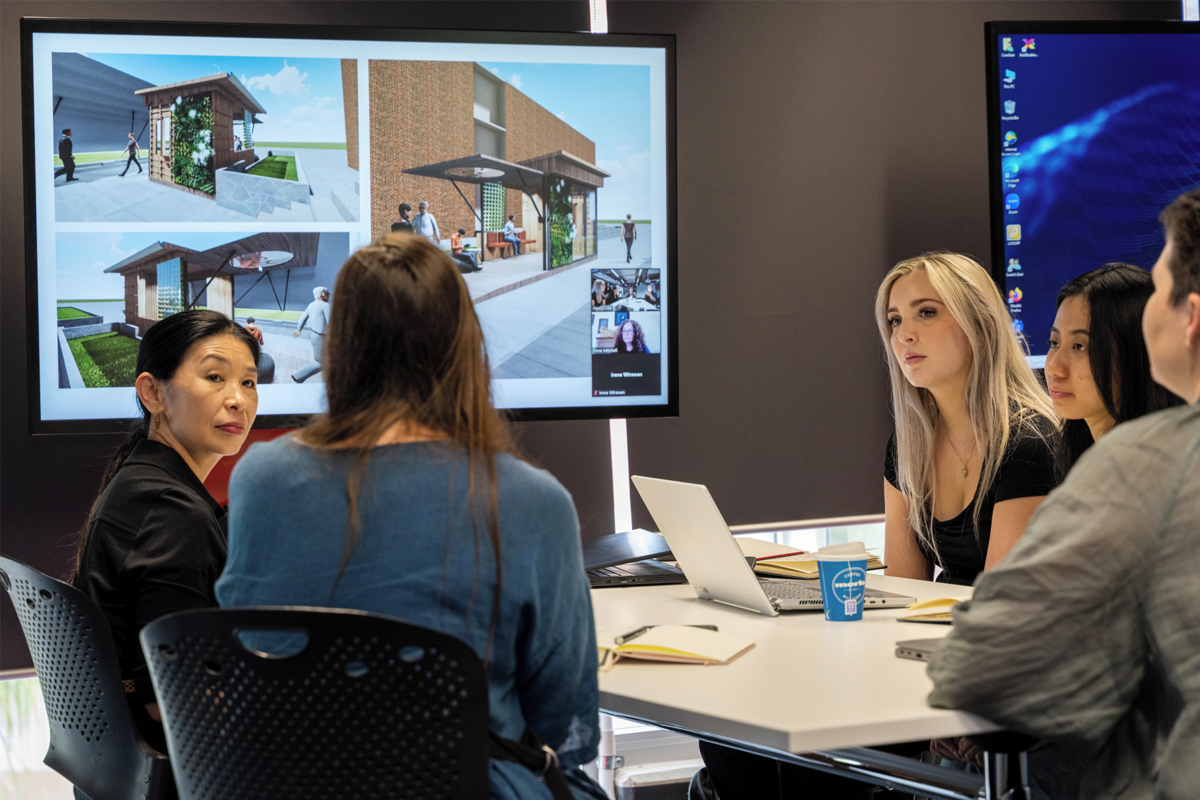
Environmental and social benefits
Environmental Benefits
- The project designs showcase sustainable design methodologies, including a circular economy approach through the use of reused and recycled materials, design for zero waste, and deconstruction at the end of life.
- Educating students on the benefits of incorporating green walls and landscaping into their designs, including for passive cooling, creating edible gardens in urban environments, and increasing biodiversity will have long-lasting environmental benefits.
- This project helped students to consider the urgent need to revisit design’s role in fuelling unsustainable lifestyles and widescale planetary damage, and to bring greater criticality to how designers approach their work and consider more deeply the impacts of their design.
Social Benefits
- The SHED is a space designed by students that will also host activities that support and encourage students to pursue knowledge and discovery outside the classroom. For example, students can get involved in growing and harvesting edible plants within the space, which can then be provided to the students or to the Student Guild for their foodbank.
- Developing a deeper understanding and recognition of Indigenous Australians’ connection to Country and knowledge of sustainability will help students apply their knowledge more broadly across the projects that they will be working on as they enter their chosen careers, benefiting wider society.
- QUT’s Deputy Vice-Chancellor (Indigenous Australians) commented through the engagement process that “It’s about the people in the space, the building is the easy part” and so the SHED has been designed to be a space where we can create deeper connections, share knowledge, and develop a deeper understanding and respect for each other and the environment.
Operational Benefits
- Engagement with QUT’s Elder in Residence and Traditional Owner provided Facilities Management with a deeper understanding and recognition of Indigenous Australians’ connection to Country and has strengthened knowledge of the Campus to Country Positioning Strategy that the team can transfer to other QUT projects.
- The SHED project helped to raise the profile of sustainability on campus and raised awareness of QUT’s commitment to sustainability and the environment amongst the students undertaking the project.
- The SHED is designed to be a sustainability engagement space on campus, helping to raise awareness of QUT’s commitment to sustainability and environment, the Sustainability Action Plan and the progress toward our goals.
- The SHED is designed to be a space where education and information can be shared about QUT’s sustainable campus initiatives including, but not limited to, the installation of solar, recycling and reuse programs, sustainable transport options, procurement activities, the Green Impact Program and biodiversity programs on campus.
- The SHED will be a space where staff and students can provide feedback about sustainability on campus.
- The SHED was designed to be an active or a passive space. When the SHED space is not activated, it will provide a sheltered space on campus, connected to the adjoining garden for staff and students to sit, study, engage, or reflect.
Sector Benefits
- During the project, we have developed videos and a case study outlining the process and the benefits of the project, across education and operations, providing resources that other universities can use when creating projects for students on campus. For more information refer to– Sustainability in Higher Education (the SHED) Project.
- The project contributed key evidence towards the Impact Labs, a set of four units, being awarded a national Australian University Teaching Award for ‘Programs that Enhance Learning’ in 2022. It provides a living example on campus of the outcome of teaching excellence.
Leadership and engagement
- The SHED project was supported by senior QUT staff including the Pro Vice-Chancellor (Sustainability Strategy), the Deputy Vice-Chancellor (Indigenous Australians), QUT’s Elder in Residence and Traditional Owner, the Director, Facilities Management, faculty deans and heads of schools, faculty and school administrators and Facilities Management staff. It took a collaborative and inclusive approach to embedding sustainability and culturally sensitive design into education whilst also providing positive operational outcomes on campus.
- The project provided students with the opportunity to engage with QUT’s Elder in Residence and Traditional Owner and QUT’s Deputy Vice-Chancellor (Indigenous Australians), who were able to guide the students on the Campus to Country Positioning Strategy and what sustainability means for Aboriginal and Torres Strait Islander people, providing a deeper understanding of and respect for First Nations people, their knowledge of sustainability and connection to Country, as well as the history of the land where QUT now stands.
- Several resources have been developed by the Sustainability Manager in collaboration with Marketing and Communications and the faculties and students to assist with communicating the project and its purpose, including the SHED video, the SHED Case Study and a time-lapse video showing the SHED building process (in progress).
- The SHED will be officially opened during QUT Sustainability Week on 21 August 2023. The student designers will be speaking at the event.
Significance to the sector
The SHED project provides an example to the sector of how course work can be translated into real world learning opportunities, through on campus projects that embody sustainability and Campus to Country principles, inspiring students, and potential students to engage in these opportunities now and into the future. The physical structure will provide an enduring example of what is possible when aspiration is connected to opportunity at QUT.
Wider societal impact
- This project provided students with the opportunity to develop theoretical knowledge of societal and global issues, and the capabilities to address these through their design, giving them the confidence to take this knowledge into the real world to benefit current and future generations.
- The SHED isa community space that is not limited to staff and student use. It will encourage the broader community to engage with the campus, our sustainability goals and the United Nations Sustainable Development Goals.
Learner/Graduate employer impact
- The project helped students to develop collaboration and engagement skills across disciplines, providing them with enhanced communication skills ready for real worldpractice.
- Understanding the realities and limitations of projects that are designed to be built, rather than simply conceptualised, and overcoming challenges that are often not experienced until a graduate has worked in the field provided real world learning and skills development.
- Real world projects have benefits to students at various stages of their degree as per the following quotes from first and third year lecturer’s Melanie Finger and Dr Anna Tweeddale. “Projects such as the SHED are imperative for our students as they come near the completion of their design degree. Having a project with a budget and a timeline for actually being built gives our students the real-world experience that they need to go confidently into the workforce.” (Quote from Melanie Finger, Unit Coordinator, Impact Lab 4 – Purpose) and “Encountering a real-world project early in a course enhances student learning by raising awareness of the range of knowledge and skills they will need to master over the course of their degree and gives them insight into why and how those various aspects will be applied in practice.” (Quote from Dr Anna Tweeddale, Unit Coordinator, DAB 101, Architectural Design 1: Explorations)
- The SHED was included in Impact Lab 4 – Purpose. The Impact Labs model of working has been endorsed by the Impact Labs being awarded institutional, national, and global awards for enhancing students’ learning and employability through collaborative and experiential design projects. One recent recognition was through the Australian Awards for University Teaching Award for ‘Programs that Enhance Learning’ in 2022 (p.29). An excerpt from the award booklet states that “Students value the contribution of the labs to their development as ethical designers with enhanced employability.”
- The project allowed all students to transition their ideas from classwork to a real-world scenario and gave the final two students the opportunity to translate what they learned and experienced in the classroom into creating a final design in a series of professional workshops where they were paid to collaborate with each other and to work with the client, the architect and the builder.
- The project contributed to the development of students’ transdisciplinary skills and expanded their outlook, whilst demonstrating each student’s potential to make a positive contribution to sustainability and develop their knowledge of and respect for Indigenous Australians’ connection to Country. Refer to the SHED Video highlighting the sentiments of Impact Lab 4 students and their lecturers.
Top 3 learnings
Category finalists
Next Generation Learning & Skills/Winners
Next Generation Learning & Skills/Winners
Next Generation Learning & Skills
Next Generation Learning & Skills
Next Generation Learning & Skills/Winners
Next Generation Learning & Skills/Winners
Next Generation Learning & Skills/Winners
Next Generation Learning & Skills/Winners
Past winners
Benefitting Society/Winners
Benefitting Society/Winners
Diversity, Equity & Inclusion in Sustainability/Winners
Diversity, Equity & Inclusion in Sustainability/Winners
Climate Action/Winners
Climate Action/Winners
Sustainability Institution of the Year/Winners
Sustainability Institution of the Year/Winners
Creating Impact/Winners
Creating Impact/Winners
Creating Impact/Winners
Creating Impact/Winners
Top 3 learnings
Next Generation Learning & Skills category
The SHED is a dedicated space to connect with the community and promote and practice sustainability at QUT and beyond. For practicality, the SHED needed to be able to function as both an active and a passive space, be transportable and be designed for deconstruction. We wanted the SHED to be more than just a space for sustainability; we wanted the project to foster collaboration across university organisational areas and provide students with real world opportunities to engage with Indigenous Australians, clients, the architect, and the builder to create a living design that could be showcased on campus, whilst also providing students with real world professional work experience. We wanted the project to embody the goals of QUT’s Education for Sustainability project (to embed sustainability into all undergraduate courses by 2026), and goals across numerous themes in the Sustainability Action Plan, whilst also considering the principles of QUT’s Campus to Country Positioning Strategy, which outlines the importance of connecting to Country and overlays the Estate Master Plan and the priorities of QUT’s Connections Strategy (2023-2027). The SHED is a small but mighty project embodying QUT values, priorities, and goals whilst also connecting student aspirations to real world opportunities.
A collaboration between Facilities Management, the Faculty of Engineering and the Faculty of Creative Industries, Education and Social Justice (CIESJ) saw the project embedded into three QUT undergraduate units. In the introductory unit UXB100 Design Thinking for the Built Environment (Faculty of Engineering, School of Architecture and the Built Environment), students were asked to prepare a brief that could actualise the project with a budget of $75,000. This student-led brief was then embedded into two units: DAB101 Architectural Design 1: Explorations (Faculty of Engineering, School of Architecture and the Built Environment) and DYB301 Impact Lab 4: Purpose (Faculty of Creative Industries, Education and Social Justice, School of Design), as a practical, sustainable design project.
Students were required to meet with the client (QUT Sustainability Manager), the Project Manager (QUT Capital Works), Principal Planning and Design Consultant (QUT Estate Planning), QUT’s Elder in Residence and Traditional Owner, and the Deputy Vice-Chancellor (Indigenous Australians) to receive input into brief development and design requirements and guidance on applying QUT’s Campus to Country Positioning Strategy principles. The designs were completed and presented to QUT Facilities Management. Facilities Management went on to select one student design from each unit DAB101 and DYB301 to be developed further and employed two students to work collaboratively with the QUT Sustainability Manager, the QUT capital works team, the architect (Eco Effective Solutions) and the builder (PODcon) to bring their design ideas together and create the final design for the Facilities Management team. The Facilities Management team engaged PODcon to build the design, which was delivered to the Gardens Point campus in early August 2023.

Environmental and social benefits
Environmental Benefits
- The project designs showcase sustainable design methodologies, including a circular economy approach through the use of reused and recycled materials, design for zero waste, and deconstruction at the end of life.
- Educating students on the benefits of incorporating green walls and landscaping into their designs, including for passive cooling, creating edible gardens in urban environments, and increasing biodiversity will have long-lasting environmental benefits.
- This project helped students to consider the urgent need to revisit design’s role in fuelling unsustainable lifestyles and widescale planetary damage, and to bring greater criticality to how designers approach their work and consider more deeply the impacts of their design.
Social Benefits
- The SHED is a space designed by students that will also host activities that support and encourage students to pursue knowledge and discovery outside the classroom. For example, students can get involved in growing and harvesting edible plants within the space, which can then be provided to the students or to the Student Guild for their foodbank.
- Developing a deeper understanding and recognition of Indigenous Australians’ connection to Country and knowledge of sustainability will help students apply their knowledge more broadly across the projects that they will be working on as they enter their chosen careers, benefiting wider society.
- QUT’s Deputy Vice-Chancellor (Indigenous Australians) commented through the engagement process that “It’s about the people in the space, the building is the easy part” and so the SHED has been designed to be a space where we can create deeper connections, share knowledge, and develop a deeper understanding and respect for each other and the environment.
Operational Benefits
- Engagement with QUT’s Elder in Residence and Traditional Owner provided Facilities Management with a deeper understanding and recognition of Indigenous Australians’ connection to Country and has strengthened knowledge of the Campus to Country Positioning Strategy that the team can transfer to other QUT projects.
- The SHED project helped to raise the profile of sustainability on campus and raised awareness of QUT’s commitment to sustainability and the environment amongst the students undertaking the project.
- The SHED is designed to be a sustainability engagement space on campus, helping to raise awareness of QUT’s commitment to sustainability and environment, the Sustainability Action Plan and the progress toward our goals.
- The SHED is designed to be a space where education and information can be shared about QUT’s sustainable campus initiatives including, but not limited to, the installation of solar, recycling and reuse programs, sustainable transport options, procurement activities, the Green Impact Program and biodiversity programs on campus.
- The SHED will be a space where staff and students can provide feedback about sustainability on campus.
- The SHED was designed to be an active or a passive space. When the SHED space is not activated, it will provide a sheltered space on campus, connected to the adjoining garden for staff and students to sit, study, engage, or reflect.
Sector Benefits
- During the project, we have developed videos and a case study outlining the process and the benefits of the project, across education and operations, providing resources that other universities can use when creating projects for students on campus. For more information refer to– Sustainability in Higher Education (the SHED) Project.
- The project contributed key evidence towards the Impact Labs, a set of four units, being awarded a national Australian University Teaching Award for ‘Programs that Enhance Learning’ in 2022. It provides a living example on campus of the outcome of teaching excellence.
Leadership and engagement
- The SHED project was supported by senior QUT staff including the Pro Vice-Chancellor (Sustainability Strategy), the Deputy Vice-Chancellor (Indigenous Australians), QUT’s Elder in Residence and Traditional Owner, the Director, Facilities Management, faculty deans and heads of schools, faculty and school administrators and Facilities Management staff. It took a collaborative and inclusive approach to embedding sustainability and culturally sensitive design into education whilst also providing positive operational outcomes on campus.
- The project provided students with the opportunity to engage with QUT’s Elder in Residence and Traditional Owner and QUT’s Deputy Vice-Chancellor (Indigenous Australians), who were able to guide the students on the Campus to Country Positioning Strategy and what sustainability means for Aboriginal and Torres Strait Islander people, providing a deeper understanding of and respect for First Nations people, their knowledge of sustainability and connection to Country, as well as the history of the land where QUT now stands.
- Several resources have been developed by the Sustainability Manager in collaboration with Marketing and Communications and the faculties and students to assist with communicating the project and its purpose, including the SHED video, the SHED Case Study and a time-lapse video showing the SHED building process (in progress).
- The SHED will be officially opened during QUT Sustainability Week on 21 August 2023. The student designers will be speaking at the event.
Significance to the sector
The SHED project provides an example to the sector of how course work can be translated into real world learning opportunities, through on campus projects that embody sustainability and Campus to Country principles, inspiring students, and potential students to engage in these opportunities now and into the future. The physical structure will provide an enduring example of what is possible when aspiration is connected to opportunity at QUT.
Wider societal impact
- This project provided students with the opportunity to develop theoretical knowledge of societal and global issues, and the capabilities to address these through their design, giving them the confidence to take this knowledge into the real world to benefit current and future generations.
- The SHED isa community space that is not limited to staff and student use. It will encourage the broader community to engage with the campus, our sustainability goals and the United Nations Sustainable Development Goals.
Learner/Graduate employer impact
- The project helped students to develop collaboration and engagement skills across disciplines, providing them with enhanced communication skills ready for real worldpractice.
- Understanding the realities and limitations of projects that are designed to be built, rather than simply conceptualised, and overcoming challenges that are often not experienced until a graduate has worked in the field provided real world learning and skills development.
- Real world projects have benefits to students at various stages of their degree as per the following quotes from first and third year lecturer’s Melanie Finger and Dr Anna Tweeddale. “Projects such as the SHED are imperative for our students as they come near the completion of their design degree. Having a project with a budget and a timeline for actually being built gives our students the real-world experience that they need to go confidently into the workforce.” (Quote from Melanie Finger, Unit Coordinator, Impact Lab 4 – Purpose) and “Encountering a real-world project early in a course enhances student learning by raising awareness of the range of knowledge and skills they will need to master over the course of their degree and gives them insight into why and how those various aspects will be applied in practice.” (Quote from Dr Anna Tweeddale, Unit Coordinator, DAB 101, Architectural Design 1: Explorations)
- The SHED was included in Impact Lab 4 – Purpose. The Impact Labs model of working has been endorsed by the Impact Labs being awarded institutional, national, and global awards for enhancing students’ learning and employability through collaborative and experiential design projects. One recent recognition was through the Australian Awards for University Teaching Award for ‘Programs that Enhance Learning’ in 2022 (p.29). An excerpt from the award booklet states that “Students value the contribution of the labs to their development as ethical designers with enhanced employability.”
- The project allowed all students to transition their ideas from classwork to a real-world scenario and gave the final two students the opportunity to translate what they learned and experienced in the classroom into creating a final design in a series of professional workshops where they were paid to collaborate with each other and to work with the client, the architect and the builder.
- The project contributed to the development of students’ transdisciplinary skills and expanded their outlook, whilst demonstrating each student’s potential to make a positive contribution to sustainability and develop their knowledge of and respect for Indigenous Australians’ connection to Country. Refer to the SHED Video highlighting the sentiments of Impact Lab 4 students and their lecturers.
Related finalists
Next Generation Learning & Skills/Winners
Next Generation Learning & Skills/Winners
Next Generation Learning & Skills
Next Generation Learning & Skills
Next Generation Learning & Skills/Winners
Next Generation Learning & Skills/Winners
Next Generation Learning & Skills/Winners
Next Generation Learning & Skills/Winners
Other finalists
Climate Action

Driving Towards Tomorrow’s Campus with Vehicle-to-Grid EV Technology
As part of Flinders University’s drive to innovate and become a leader in climate action, the University launched its Vehicle-to-Grid (V2G) initiative. This involved installing and maintaining 20x V2G and smart chargers for its growing electric vehicle fleet. Leveraging 100% renewable energy generated by ENGIE’s Willogoleche Wind Farm and Flinders University’s solar power systems, this enables the storage of renewable energy in EV batteries to be discharged on campus during peak demand periods. Hence, allows for these EV fleets to operate as a Virtual Power Plant (VPP) to deliver peak demand management and optimization of behind-the-meter generation.
Overall, this initiative demonstrates the reliability and scalability of bi-directional and uni-directional smart-charging systems for EVs in reducing GHG emissions while facilitating teaching, research, and innovation opportunities. Moreover, it exemplifies a sustainable and innovative solution to scale energy storage technology and increase renewables.
Sustainability Champion – Staff/Winners

Brandan Espe
Environmental Officer / Acting Grounds Supervisor
Brandan has brought over 50 federally listed Endangered species of plant into the James Cook University living collection, many of which have never been cultivated and are found in no other collection in the world.
Of these, over half have been sustainably wild collected, inclusive of field and clone data, so they can be used for ongoing conservation, research and teaching, the remaining being sourced from private and partner organisations through favours of service or trades.
He personally funded the project from 2019-2022, until funding was awarded for the program due to its success, with the program now being engrained into the Universities landscapes for ongoing management should he leave JCU, creating a threatened species legacy collection.
The program has now expanded beyond this, with an additional 48 species now funded for further addition, some of which are only known from less than 5 sightings in history.
Student Engagement

Sustainability Leaders creating real impact!
La Trobe created a unique Sustainability Leaders volunteering program to increase engagement with students on campus and empower them to act against waste and promote sustainability. It included the following initiatives:
- Promoting the reusable crockery implementation,
- Increasing knowledge action of other students on campus to diversion comingled recycling and organic waste from landfill.
- Focus on waste audits and data,
- Improved signage through new waste posters for students living on campus.
- Collaboration with Cirka (our cleaning and waste partner) to create a waste wall and;
- Learning all things sustainability (net zero, biodiversity, waste, reusables, engagement)
These initiatives yielded significant results and with a reduction in waste contamination by almost 40% at the residential buildings and engagement with over 80 groups of people for the Reusable Revolution.
Creating Impact

Where knowledge meets habits: Empowering students for a sustainable tomorrow
Our online Sustainability Challenges offer participants an engaging, self-paced learning experience centered around a specific United Nations Sustainable Development Goal (UNSDG). Requiring minimal resourcing and at zero-cost to participants, we’ve created replicable, compact, scalable, and impactful learning opportunities that result in real impact.
The Challenges follow a structured process that moves participants from knowledge gain to simple action to celebration, to establish small but mighty habits relating to waste and carbon emissions. This approach recognises that knowledge alone is often insufficient to drive behaviour change, and that ease of action and celebration are crucial components in creating sustainable habits.
Sustainability Champion – Staff/Winners

Catherine (CeeJay) Donovan
Veterinary nurse – Anaesthesia
From establishing the Massey Vet School Green Team to leading impactful initiatives, my commitment to environmental sustainability has been making waves. With the help of my team, I have accomplished numerous small, yet meaningful actions, including integrating a sustainability lecture for final year vet students and implementing battery recycling alongside rechargeable battery use. Our larger projects encompass the introduction of green waste and soft plastics recycling bins, an energy audit resulting in power-saving measures, and playing a part in a successful rubbish audit. I spearheaded the ‘6 in 6’ campaign, empowering individuals with six simple steps for workplace sustainability. Through the SustainaVet social media pages I help to educate and inspire peers nationwide. As the Massey School of Veterinary Science sustainability champion, I had the privilege of speaking at the annual veterinary conference on sustainability in clinical practice. Currently I’m conducting pioneering research on responsible cat waste disposal. Together, we’re forging a greener future, one initiative at a time.
Sustainability Champion – Student

Louis Walmsley
SDG Coordinator Monash Association of Sustainability, Office Bearer Monash Student Association’s Environmental and Social Justice Department, Masters of Environment and Sustainability Student
Louis is an exceptional student sustainability leader at Monash University. His passion and dedication to sustainability have made a significant impact on the community. Louis’s values revolve around sustainability, which is evident upon meeting him. He actively participates in various sustainability groups, demonstrating his commitment to creating a more environmentally conscious society.
One of Louis’s notable involvements is with Precious Plastic Monash, where he organizes remarkable events and fosters collaboration among like-minded individuals, student groups, and staff. His contributions to the Monash Association of Sustainability have allowed him to conduct valuable research on plastic usage and climate action, resulting in positive changes within the university.
Through his work with the Monash Student Association, Louis has engaged hundreds of students in fun and interactive sustainability initiatives. He took the initiative to organize a sustainability food fair, which was one of the largest sustainability-related events held at Monash post-COVID. This accomplishment is a true testament to Louis’s hard work and creativity.
Louis is an outstanding student leader whose efforts in sustainability have had a lasting impact on Monash University and its community. His inspiring nature resonates with everyone who knows him.




